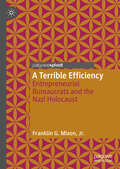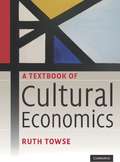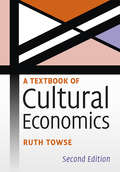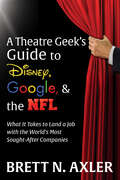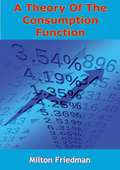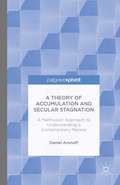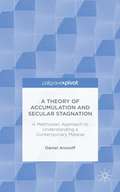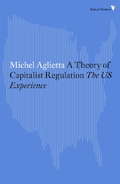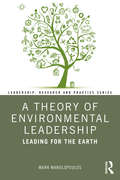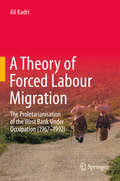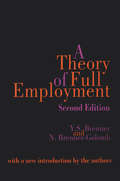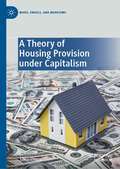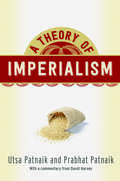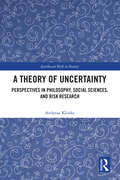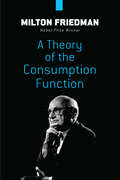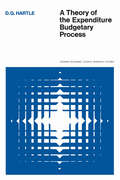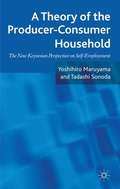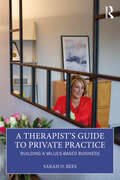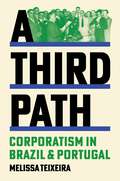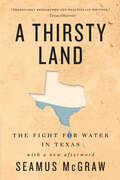- Table View
- List View
A Terrible Efficiency: Entrepreneurial Bureaucrats and the Nazi Holocaust
by Franklin G. Mixon, Jr.This book provides numerous examples that apply the modern theory of bureaucracy developed in Breton and Wintrobe (1982 and 1986) to the Nazi Holocaust. More specifically, the book argues, as do Breton and Wintrobe (1986), that the subordinates in the Nazi bureaucracy were not “following orders” as they claimed during the war crimes trials at Nuremberg and elsewhere, but were instead exhibiting an entrepreneurial spirit in competing with one another in order to find the most efficient way of exacting the Final Solution. This involved engaging in a process of exchange with their superiors, wherein the subordinates offered the kinds of informal services that are not codified in formal contracts. In doing so, they were competing for the rewards, or informal payments not codified in formal contracts, that were conferred by those at the top of the bureaucracy. These came in the form of rapid promotion, perquisites (pecuniary and in-kind), and other awards. The types of exchanges described above are based on “trust,” not formal institutions.
A Test of the General Validity of the Heckscher-Ohlin Theorem for Trade in the European Community
by Dalia HakuraA report from the International Monetary Fund.
A Textbook of Cultural Economics
by Ruth TowseWhat determines the price of a pop concert or an opera? Why does Hollywood dominate the film industry? Does illegal downloading damage the record industry? Does free entry to museums bring in more visitors? In A Textbook of Cultural Economics, one of the world's leading cultural economists shows how we can use the theories and methods of economics to answer these and a host of other questions concerning the arts (performing arts, visual arts and literature), heritage (museums and built heritage) and creative industries (the music, publishing and film industries, broadcasting). Using international examples and covering the most up-to-date research, the book does not assume a prior knowledge of economics. It is ideally suited for students taking a course on the economics of the arts as part of an arts administration, business, management, or economics degree.
A Textbook of Cultural Economics
by Ruth TowseNow in its second edition, A Textbook of Cultural Economics is an established resource for many courses, including economics of the arts, the cultural and media industries, and the digital creative economy. Authored by Ruth Towse, a widely recognised expert in cultural economics, the book offers a comprehensive, up-to-date overview and analysis of the field in the digital era. Written in an accessible style, and with suggestions for further reading, it covers a range of topics, from the more traditional arts to the creative industries (such as music, film, games, broadcasting, and publishing), as well as the economics of artists' labour, markets and copyright. This second edition considers the creative economy up to the present, emphasising the role of digitisation across the creative industries. It will appeal to students taking courses in the economics of art and culture, and can also be used in courses on arts management and cultural policy.
A Theatre Geek's Guide to Disney, Google, & the NFL: What It Takes to Land a Job with the World's Most Sought-After Companies
by Brett N. AxlerEver wonder what it takes to land a job with the world’s most sought after companies? In A Theatre Geek’s Guide to Disney, Google, and the NFL, Brett Axler pulls back the curtain to reveal the steps from his journey and the lessons he learned along the way. From his early years in community and regional theater to landing his first job with an NFL-team, Axler shares the simple and normally overlooked steps applicants can take to land their dream job. He busts the classic experience and education requirement myths and outlines the powerful alternatives that make applicants stand out from the crowd. Using his own personal victories and defeats along with stories from the dozens of students and young professionals that he’s mentored, Axler shares the step-by-step do’s and don’ts of navigating a young career. Through his years at Comcast and Disney to his recent adventures that led him to Google, Axler shares his insights about education, professional networking, job searching, applying for the job, getting a resume to the top of the pile, and nailing an interview. With A Theatre Geek’s Guide to Disney, Google, and the NFL, buckle up for a wild story full of priceless know-how from a theatre geek that accidentally found himself in professional sports and corporate America.
A Theory Of The Consumption Function
by Milton FriedmanWhat is the exact nature of the consumption function? Can this term be defined so that it will be consistent with empirical evidence and a valid instrument in the hands of future economic researchers and policy makers? In this volume a distinguished American economist presents a new theory of the consumption function, tests it against extensive statistical J material and suggests some of its significant implications.Central to the new theory is its sharp distinction between two concepts of income, measured income, or that which is recorded for a particular period, and permanent income, a longer-period concept in terms of which consumers decide how much to spend and how much to save. Milton Friedman suggests that the total amount spent on consumption is on the average the same fraction of permanent income, regardless of the size of permanent income. The magnitude of the fraction depends on variables such as interest rate, degree of uncertainty relating to occupation, ratio of wealth to income, family size, and so on.The hypothesis is shown to be consistent with budget studies and time series data, and some of its far-reaching implications are explored in the final chapter."...the most influential economist of the second half of the 20th century...possibly of all of it."--The Economist"Friedman argued that the best way to make sense of saving and spending was not, as Keynes had done, to resort to loose psychological theorizing, but rather to think of individuals as making rational plans about how to spend their wealth over their lifetimes...The details are a bit technical, but Friedman's 'permanent income hypothesis' and the Ando-Modigliani 'life cycle model' resolved several apparent paradoxes about the relationship between income and spending, and remain the foundations of how economists think about spending and saving to this day."--Paul Krugman, New York Times
A Theory of Accumulation and Secular Stagnation: A Malthusian Approach To Understanding A Contemporary Malaise
by Daniel AronoffThomas Malthus identified a crucial tension at the heart of a market economy: While an accumulation of wealth is necessary to provide the capital investment needed to generate growth, too much accumulation will cause planned saving to exceed profitable investment, which will result in secular stagnation, a condition of low growth and underemployment of resources. Keynes drew inspiration from Malthus in his attempt to comprehend the causes of the Great Depression of the 1930s. Now, Aronoff demonstrates how a related but slightly different aspect of Malthus' thought can illuminate one of the most pressing issues of our times. In A Theory of Accumulation and Secular Stagnation, Aronoff explores Malthus' ideas relating to secular stagnation and uses the insight gained to understand the origins of the subpar growth and tepid employment, periodically punctuated by booms, that has plagued the US economy since the turn of the millennium. He explains how the rise of mercantilism among Asian countries – principally China – and increased income concentration generated an upsurge in excess saving. This accumulation created a chronic deficiency in demand while also depressing interest rates, which generated a search for yield that fuelled periodic booms.
A Theory of Accumulation and Secular Stagnation: A Malthusian Approach to Understanding a Contemporary Malaise
by Daniel AronoffA Theory of Accumulation and Secular Stagnation.
A Theory of Capitalist Regulation
by Michel AgliettaMichel Aglietta's path-breaking book is the first attempt at a rigorous historical theory of the whole development of US capitalism, from the Civil War to the Carter presidency. A major document of the "Regulation School" of heterodox economics, it was received as the boldest book in its field since the classic studies of Paul Baran, Paul Sweezy and Harry Braverman.This edition includes a substantial postface by Aglietta, which situates regulation theory in the context of twenty-first-century capitalism.From the Trade Paperback edition.
A Theory of Environmental Leadership: Leading for the Earth (Leadership: Research and Practice)
by Mark ManolopoulosIn A Theory of Environmental Leadership, Mark Manolopoulos draws on his original model of leading outlined in his cutting-edge book Following Reason to derive and develop the first properly systematic model of eco-leadership. Suppose humanity’s relation with the Earth may be described in terms of leadership "stages" or modalities: once upon a time, the Earth led or ruled humanity, and now we humans rule or lead the Earth. When the Earth led, the Earth flourished; now that humankind leads, the Earth flounders - ecological crises multiply and intensify. However, there might be a third stage or modality of leadership: humanity leading for the Earth, leading in a way that allows the world, including humans, to re-flourish. What would be the nature of this truly environmental form of leadership? A Theory of Environmental Leadership identifies and critically analyzes the two basic and incompatible positions associated with the way we construe and interact with the non-human: anthropocentrism (human supremacism) and ecocentrism (ecological egalitarianism). By rigorously analyzing and leveraging this polarity, this book outlines an innovative theory of eco-leadership together with some of its confronting-but-necessary measures. Expansive and incredibly timely, A Theory of Environmental Leadership is ideal for a range of audiences, from scholars and students of environmental leadership studies to activists and policymakers. The book’s remarkable clarity and engaging character also makes it suitable for the general public.
A Theory of Forced Labour Migration: The Proletarianisation of the West Bank Under Occupation (1967-1992)
by Ali KadriThis book focuses on labour dislocation and migration of Palestinians between 1967 and 1992. In particular, it highlights the social transformations in the occupied Palestinian territory where Palestinian labour was permitted to work in Israel from 1968 onwards. Elaborating on the results of the policy which saw a gradual increase in the number of Palestinian workers commuting daily from a negligible proportion of the actively participating labour force, to 35 percent of all employed persons, and 60 percent of all wage paid workers, the book studies this unique case which embodies characteristics from permanent migration situations not only in the de-jure, but also the de-facto sense; insofar as it embeds higher risks and reallocates resources as if it was a permanent relocation scenario. Illustrated with tables and econometric results, the book identifies the determinants and implications of migrant labour from the West Bank using two broad methodologies: the neoclassical and the historical-structural method. Each of these methods is divided into two branches: the classical divided into price determined and a choice-theoretic framework,and the historical-structural divided into dependency and Marxist theory. In order to gain a comprehensive understanding of the situation, all four perspectives are employed in the investigation. In doing so, what emerges is a structure for the book which takes shape along the different lines of migration literature. The book provides new insights into the making of wage labour and labour migration theory.
A Theory of Full Employment
by Nancy Brenner-GolombIn A Theory of Full Employment, Y. S. Brenner reviews the current drift toward a society he finds neither economically expedient nor morally attractive, and N. Brenner-Golomb discusses the risks involved for science and society in the newfangled sophism hiding behind post-modern ideas and "political correctness." Both authors emphasize the need to revive the public's political engagement and revise economic theory to restore to society the humane perspective that inspired the welfare state. They contend that if people will abandon outworn habits of thought, consider alternatives, and renew their political engagement, they may find useful employment for all who are able and willing to work and end the fear of destitution. Although scientists' philosophical backgrounds seldom influence their answers, they do determine their questions, and the final outcome can depend on this. Neoclassical economists are ill equipped to ask questions about the long-term dynamic processes of our complex economic reality. They leave out of their models variables not easily quantified and prefer mathematical precision to the study of the intricacy of life. Paul Samuelson, Robert Solow, and others have tried to overcome this by grouping self-adjusting elements into "proxy" variables, thus synthesizing neoclassical and Keynesian ideas. But most of today's critics of the ruling dogma go largely unheard. This volume is intended to convince professional economists who study the economic system as a whole to reexamine some of the assumptions behind reigning economic theories. A second objective is to explain to the general public why currently fashionable policies cannot solve massive long-term unemployment. Finally, it shows that if political engagement is revived, we may escape the economic morass and moral wasteland into which, the fashionable policies have been leading us since the 1970s. This book will appeal to economists, politicians, sociologists, and a wider public concerned about today's economic malaise.
A Theory of Housing Provision under Capitalism (Marx, Engels, and Marxisms)
by Mike BerryThis book provides the first coherent Marxist analysis of the central importance of housing in the social reproduction of capitalism as a whole. Rather than consigning housing to the sidelines, Berry argues that the circulation of capital and revenues though housing and the built environment helps explain how the capital-labour relation constrains housing outcomes while also being reproduced on an extended scale. He shows how housing is provided by the intervention of building, property and interest-bearing capital fractions; how the land question can be explained by a theory of urban land rent, drawing on Marx's categories of differential and monopoly rent; how housing is vital to the extended reproduction of labour power, while also creating a semi-separate sphere of 'home' in which gender and demographic factors overlay and accentuate social class position. The modes, impact and drivers of state intervention in housing provision are seen to modify the patterns and pace of capital circulation through housing and the urban built environment with implications for shifts in class fragmentation and power relations.
A Theory of Imperialism
by Utsa Patnaik Prabhat PatnaikIn A Theory of Imperialism, economists Utsa Patnaik and Prabhat Patnaik present a new theory of the origins and mechanics of capitalism that sounds an alarm about its ongoing viability. Their theory centers on trade between the core economies of the global North and the tropical and subtropical countries of the global South and considers how the Northern demand for commodities (such as agricultural products and oil) from the South has perpetuated and solidified an imperialist relationship. The Patnaiks explore the dynamics of this process and discuss innovations that could allow the economies of the South to achieve greater prosperity without damaging the economies of the North. The result is an original theory of imperialism that brings to light the crippling limitations of neoliberal capitalism.A Theory of Imperialism also includes a response by David Harvey, who interprets the agrarian system differently and sees other factors affecting trade between the North and the South. Their debate is one of the most provocative exchanges yet over the future of the global economy as resources grow thin, populations explode, and universal prosperity becomes ever more elusive.
A Theory of International Crisis Lending and IMF Conditionality
by Jonathan D. Ostry Olivier Jeanne Jeromin ZettelmeyerA report from the International Monetary Fund.
A Theory of Uncertainty: Perspectives in Philosophy, Social Sciences, and Risk Research (Earthscan Risk in Society)
by Andreas KlinkeUsing sources from classical to modern that broach the phenomenon of uncertainty and its relation to risk, this book creates a novel approach to the recognized but theoretically often unattended issue of uncertainty.Andreas Klinke develops a new, general theory of uncertainty that provides a taxonomy of categories which are deduced from a critical inventory in philosophy, social and natural sciences, and risk research. Comprising six parts, the philosophical grounding of uncertainty sets the stage for the following philosophical and social scientific accounts and explanation of four distinctive guises of uncertainty that form a taxonomic notion and rationale: ontological, epistemological, linguistic-communicative, and teleological uncertainty. The theoretical-conceptual rumination provides a complex, differentiated view of the anatomy of uncertainty and an understanding that can be used in further theoretical and empirical research, as well as socio-political practice. The latter is delineated in the final part addressing the societal domestication of uncertainty.This book will be of great interest to scholars and students in philosophy, social and natural sciences, risk research, as well as inter- and transdisciplinary science fields.
A Theory of the Consumption Function
by Milton FriedmanIn this groundbreaking work, a Nobel Prize-winning economist addresses the consumption behavior of individuals and how it can be defined in a way that is supported by empirical evidence and useful for research and planning. Milton Friedman introduced a distinction between "measured income," what an individual earns in a specific period, and "permanent income," a view that takes into account a longer period in an active economic life. He was thus able to suggest that consumption tends to be, on average, the same fraction of permanent income regardless of the income's extent and that the magnitude of the fraction depends on many variables, including interest rates and family size. Dr. Friedman was among the most prominent American economists of the twentieth century, a powerful advocate of free market capitalism, and one of the founders of the well-known Chicago School of Economics. The concepts he introduced in this thought-provoking book achieved broad acceptance, stimulating further study and developing far-reaching effects on economic theory.
A Theory of the Expenditure Budgetary Process
by Douglas HartleThis crisp, provocative, lively, sometimes opinionated analysis is an important contribution to the scanty Canadian literature on the politics of the budgetary process. It is an important theoretical contribution to the study of political decision-making made by an economist. Speaking from personal experiences of the administrative struggles that lie behind evolving federal expenditure priorities, Professor Hartle offers an original, and at times devastating, review of the theories of public decision-making advanced by such analysts as Downs, Breton, Niskanen, and Wildavsky. He argues that their inadequacies can be overcome if politics, like the economy, is recognized as a process in which individuals and groups seek to maximize their satisfactions. He shoes how the federal budget is the outcome of a series of utility-maximizing games between politicians, bureaucrats, interest-group leaders, journalists, and voters. His approach is clearly applicable to decision-making in all organizations, both public and private. This study will appeal especially to economists and political scientists as an example of how the insights of their two disciplines can be combined. As a stimulating investigation of how government really works, it will greatly interest not only specialists in public administration but also anyone concerned with the larger issues of how decisions are reached under the conditions imposed by large modern organizations.
A Theory of the Producer-Consumer Household
by Yoshihiro Maruyama Tadashi SonodaThe quick recovery of Asian economies from recent recessions in comparison to the struggling American and European economies can be attributed in part to the positive aggregate-demand externalities of their self-employment sectors. This book presents a behavioural analysis of this effect, with a detailed focus onproducer households. "
A Therapist’s Guide to Private Practice: Building a Values-based Business
by Sarah ReesThis book is a comprehensive guide to setting up, running and growing a successful private therapy practice that resonates with your values and professional goals.Guiding you through every detail, from making the initial decision to set up your own private therapy practice to scaling your practice, this guide will support you in overcoming the common challenges you may encounter. It is filled with practical exercises, templates and checklists, including business planning actions at the end of each chapter so you can craft your first business plan. Ensuring you have a solid foundation and can shape a private therapy practice that meets your financial and personal needs while reflecting the passion that led you to your profession.A motivational and inspiring read for therapists, psychotherapists, coaches, and counselors. Get ready to turn your dream into reality and create something profoundly impactful and uniquely yours.
A Third Path: Corporatism in Brazil and Portugal (Histories Of Economic Life Ser. #4)
by Melissa TeixeiraHow Brazil and Portugal experimented with corporatism as a &“third path&” between laissez-faire capitalism and communism Following the Great Depression, as the world searched for new economic models, Brazil and Portugal experimented with corporatism as a &“third path&” between laissez-faire capitalism and communism. In a corporatist society, the government vertically integrates economic and social groups into the state so that it can manage labor and economic production. In the 1930s, the dictatorships of Getúlio Vargas in Brazil and António de Oliveira Salazar in the Portuguese Empire seized upon corporatist ideas to jump-start state-led economic development. In A Third Path, Melissa Teixeira examines these pivotal but still understudied initiatives.What distinguished Portuguese and Brazilian corporatism from other countries&’ experiments with the mixed economy was how Vargas and Salazar dismantled liberal democratic institutions, celebrating their efforts to limit individual freedoms and property in pursuit of economic recovery and social peace. By tracing the movement of people and ideas across the South Atlantic, Teixeira vividly shows how two countries not often studied for their economic creativity became major centers for policy experimentation. Portuguese and Brazilian officials created laws and agencies to control pricing and production, which in turn generated new social frictions and economic problems, as individuals and firms tried to evade the rules. And yet, Teixeira argues, despite the failings and frustrations of Brazil&’s and Portugal&’s corporatist experiments, the ideas and institutions tested in the 1930s and 1940s constituted a new legal and technical tool kit for the rise of economic planning, shaping how governments regulate labor and market relations to the present day.
A Thirsty Land: The Fight for Water in Texas (Natural Resources Management and Conservation)
by Seamus McGraw“An important story not just about [Texas’s] water history, but also about its social, economic, and political identity” (Western Historical Quarterly).As a changing climate threatens the whole country with deeper droughts and more furious floods that put ever more people and property at risk, Texas has become a bellwether state for water debates. Will there be enough water for everyone? Is there the will to take the steps necessary to defend ourselves against the sea? Is it in the nature of Americans to adapt to nature in flux?The most comprehensive—and comprehensible—book on contemporary water issues, A Thirsty Land delves deep into the challenges faced not just by Texas but also by the nation, as we struggle to find a way to balance the changing forces of nature with our own ever-expanding needs. Part history, part science, part adventure story, and part travelogue, this book puts a human face on the struggle to master that most precious and capricious of resources, water. Seamus McGraw goes to the taproots, talking to farmers, ranchers, businesspeople, and citizen activists, as well as to politicians and government employees. Their stories provide chilling evidence that Texas—and indeed the nation—is not ready for the next devastating drought, the next catastrophic flood. Ultimately, however, A Thirsty Land delivers hope. This deep dive into one of the most vexing challenges facing Texas and the nation offers glimpses of the way forward in the untapped opportunities that water also presents.“A hard look at a hard problem: finding sufficient water to live in a place without much of it. . . . McGraw’s fine book serves as a useful guide. Observers of Western waterways will want to have this on their shelves alongside the likes of Marc Reisner and Charles Bowden.” —Kirkus Reviews“In stark prose that often gleams like a bone pile bleached in the sun, McGraw travels back and forth across Texas to give a free-ranging but deadeye view of the crisis on the horizon.” —Texas Monthly“It’s hard to write about the slow creep of environmental crises like drought without resorting to shock tactics or getting lost in the weeds . . . [McGraw] draws out the conflicts in compelling ways by drilling into the plight of individual water users. Even if you feel no connection to Texas, these stories are relevant to every part of the country.” —Outside“Interviewing both scientific experts and everyday water users, [McGraw] clearly delineates the competing interests, describes political and geological reality, and makes a compelling argument for statewide water policy that utilizes modern technology and fairly weighs parochial needs against the good of the whole.” —Arizona Daily Star, Southwest Books of the Year
A Thirsty Land: The Fight for Water in Texas (Natural Resources Management and Conservation)
by Seamus McGraw“An important story not just about [Texas’s] water history, but also about its social, economic, and political identity” (Western Historical Quarterly).As a changing climate threatens the whole country with deeper droughts and more furious floods that put ever more people and property at risk, Texas has become a bellwether state for water debates. Will there be enough water for everyone? Is there the will to take the steps necessary to defend ourselves against the sea? Is it in the nature of Americans to adapt to nature in flux?The most comprehensive—and comprehensible—book on contemporary water issues, A Thirsty Land delves deep into the challenges faced not just by Texas but also by the nation, as we struggle to find a way to balance the changing forces of nature with our own ever-expanding needs. Part history, part science, part adventure story, and part travelogue, this book puts a human face on the struggle to master that most precious and capricious of resources, water. Seamus McGraw goes to the taproots, talking to farmers, ranchers, businesspeople, and citizen activists, as well as to politicians and government employees. Their stories provide chilling evidence that Texas—and indeed the nation—is not ready for the next devastating drought, the next catastrophic flood. Ultimately, however, A Thirsty Land delivers hope. This deep dive into one of the most vexing challenges facing Texas and the nation offers glimpses of the way forward in the untapped opportunities that water also presents.“A hard look at a hard problem: finding sufficient water to live in a place without much of it. . . . McGraw’s fine book serves as a useful guide. Observers of Western waterways will want to have this on their shelves alongside the likes of Marc Reisner and Charles Bowden.” —Kirkus Reviews“In stark prose that often gleams like a bone pile bleached in the sun, McGraw travels back and forth across Texas to give a free-ranging but deadeye view of the crisis on the horizon.” —Texas Monthly“It’s hard to write about the slow creep of environmental crises like drought without resorting to shock tactics or getting lost in the weeds . . . [McGraw] draws out the conflicts in compelling ways by drilling into the plight of individual water users. Even if you feel no connection to Texas, these stories are relevant to every part of the country.” —Outside“Interviewing both scientific experts and everyday water users, [McGraw] clearly delineates the competing interests, describes political and geological reality, and makes a compelling argument for statewide water policy that utilizes modern technology and fairly weighs parochial needs against the good of the whole.” —Arizona Daily Star, Southwest Books of the Year
A Thoughtful Workout: Real World Strategies for Receiving Tough Feedback, Seeking Competitive Advantage, and Populating Frameworks with Incomplete Information
by Jay Barney Patricia Gorman Clifford"What I Didn't Learn in Business School" is a fictional account that follows new consultant Justin Campbell as he joins an elite team hired by a chemical firm to assess the potential of a newly developed technology. This chapter joins Justin, as he processes some tough criticism from his boss about his inability to step back and see the big picture objectively, rather than getting caught up in the persuasive, but potentially biased arguments of the individuals working on the ground in the client organization. Authors Jay Barney and Trish Gorman Clifford allow you to experience the disheartening mistakes of a new consultant and in the process, learn how to avoid certain pitfalls and develop informed and clear-sighted perspectives as you analyze your strategic options. This chapter was originally published as Chapter 6 of "What I Didn't Learn in Business School: How Strategy Works in the Real World."
A Thousand Plateaus: Capitalism and Schizophrenia
by Gilles Deleuze Felix GuattariPostmodern analysis of the culture of late capitalism.
